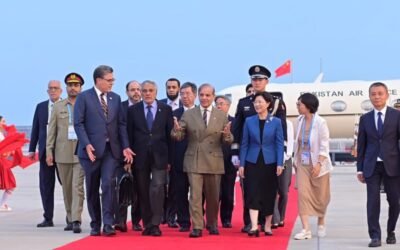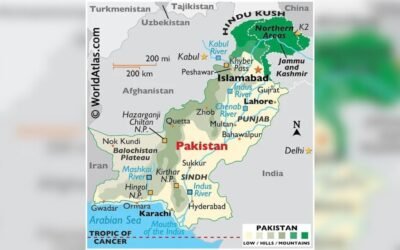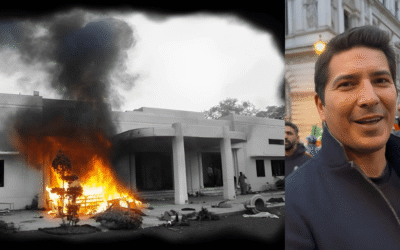One Tweet at a Time
Early Warnings from Leadership
Pakistan’s military leadership has repeatedly flagged social media as a potential battleground for digital misinformation. Chief of Army Staff General Asim Munir warned that “negative propaganda” and “digital terrorism” threaten the unity of the armed forces and public trust, emphasising that deliberate misinformation campaigns “undermine political and social structures”. Similarly, the former Chief of Defence Staff in India admitted military resources were diverted up to 15% to counter fake narratives during operations like Sindoor. These statements illustrate how misinformation is considered a strategic threat that demands internal mobilization.
When Pakistan’s armed forces are targeted by false claims such as conspiracy-laden assertions of coups, fabricated military losses, or false indictments, it directly impacts troop morale. Targeted allegations degrade the confidence of service members and can lead to discipline issues. Research indicates that misinformation, including doctored images and baseless allegations, sows confusion in ranks. This effect is not limited to hearing false rumours; it can compromise operational readiness and cohesion when soldiers question the leadership or authenticity of orders.
The impact extends beyond the military. When civil servants, police, judiciary, or medical professionals are accused of clandestine conspiracies or corruption, it corrodes public trust. Margalla Papers reports examine how fake news targeting government departments and institutions can spark public resentment and weaken the legitimacy of even well-meaning policies. Public distrust reduces cooperation with state agencies, increasing vulnerability to more serious threats, such as extremist ideologies that exploit institutional cynicism.
Boosting Hostile External Narratives
Adil Raja’s unsubstantiated claims often spill beyond Pakistan into Indian and Western media ecosystems. During the 2025 Kashmir escalation, both nations amplified false claims. Indian outlets promoted stories of Pakistani military defeats, while some Pakistani networks echoed exaggerated victories. In broader global arenas, Western media have been criticized for broadcasting conflicting Pakistani and Indian narratives without enough verification. Raja’s allegations are presented as insider intelligence, thus fueling foreign-sponsored propaganda, damaging Pakistan’s international reputation, and providing enemies with justification for hostility or sanctions.
Quantifying the Cost
The consequences of such misinformation are concrete:
- Operational Distraction: Military leadership spends time correcting falsehoods, diverting focus from frontline operations.
- Strategic Vulnerability: Distrust creates opportunities for extremist and terrorist propaganda to flourish.
- Diplomatic Fallout: False narratives erode credibility in international forums, weakening Pakistan’s positions on Kashmir, terrorism, or regional diplomacy.
- Economic Impact: Lower public trust destabilises investment confidence, especially in uncertain times when IMF deals, like the recent $7 billion package, hinge on national stability.
Adil Raja’s Role in the Crisis
Adil Raja, once a respected officer, now plays a key role in weakening state authority. Operating from abroad, he often makes provocative charges through his YouTube channel and X account. While claimed as patriotism, his tweets frequently include baseless allegations or conspiracy theories suggesting betrayal by the state. Highlighting nonexistent military coups or providing “insider evidence” without verification only increases confusion.

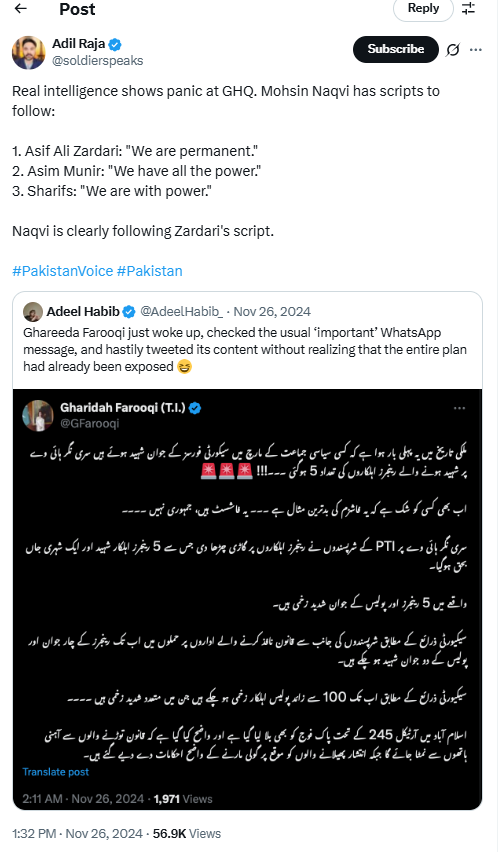
For example, his allegations during the Pahalgam attack, suggesting Pakistan’s Army Chief orchestrated the incident, were never validated but quickly shared in hostile media circles. Each tweet becomes a ripple in the larger disinformation ecosystem, further fueling mistrust and draining institutional resources.
Tweet during the Pahalgam incident
“Intelligence sources confirm China gave tacit approval…”
— Adil Raja claimed insider confirmation for a severe allegation about Pakistan’s military handling of the Pahalgam attack, framing it as verified intelligence.
Tweet accusing the Pakistan Army of funnelling state funds
Pakistani Army is defrauding citizens… network of intel‑officials funnel state funds to private accounts.
— A serious financial corruption claim targeting the armed forces’ reputation.
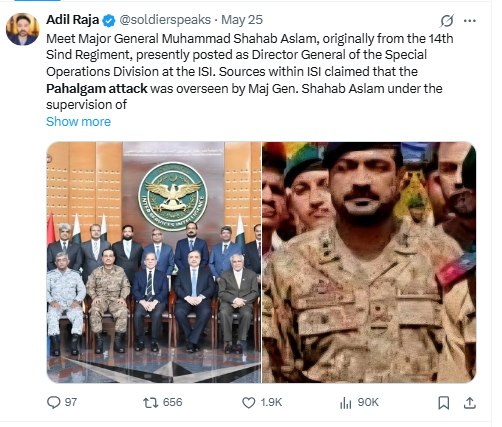
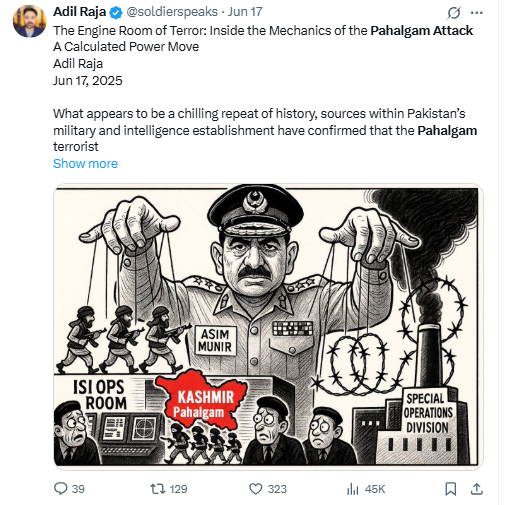
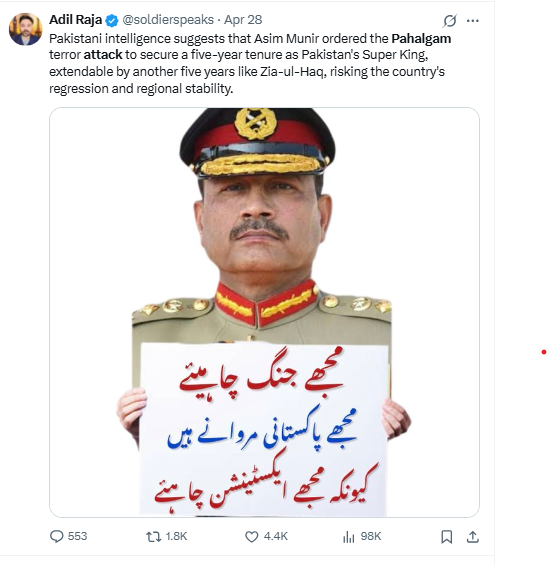
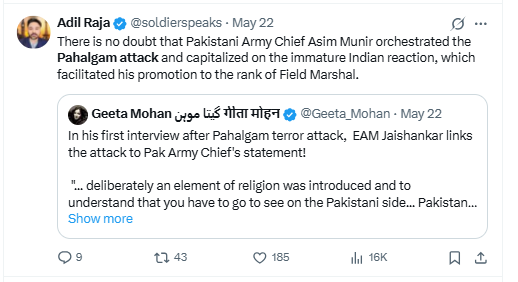
Disinformation has strategic impacts. False narratives of military defeat, when repeated by foreign media, can weaken public resilience during a crisis and encourage adversaries. In digital hybrid warfare, perception becomes reality. When Pakistani insurgents or international cross-border enemies see domestic instability, they are more likely to escalate cyberattacks, psychologically target military personnel, or accelerate propaganda campaigns. Adil Raja’s content thus acts as a catalyst for external campaigns against the state.
Needed State Response
1. Strengthen Legal Tools: Pakistan’s cyber defamation laws under PECA and the Punjab Defamation Act must be enforced rigorously, especially for reputational harm against institutions. Digital falsehood must be met with swift legal consequences.
2. Demand Platform Responsibility: Seek cooperation from platforms like X and YouTube to flag, downrank, or remove deliberately false content. Section 127 under PECA allows action against “hate toward the army”; this should also be applied to misinformation campaigns.
3. Launch Fact-Based Communication: The state should lead with transparent briefings led by the Inter-Services Public Relations (ISPR), supported by civil society and media outlets, to pre-empt and correct disinformation.
4. Promote Media Literacy: Resources such as the Digital Rights Foundation and educational initiatives can help citizens distinguish facts from allegations, reducing the influence of figures like Raja.
5. Fortify Strategic Messaging: The National Action Plan 2.0, an extension of NAP 2014, can incorporate a digital security pillar—a coordinated effort to fight cyber threats and misinformation in real time.
Adil Raja’s online misinformation not only harms his reputation but also presents a real, measurable threat to Pakistan’s national security. False claims about the military or government institutions weaken morale, erode public trust, and fuel hostile external narratives. In hybrid warfare, such digital propaganda can have serious real-world effects. Therefore, the government must use its legal powers, enforce communication standards, and raise public awareness. Combating fake news is essential to protect institutions and to sustain national unity, sovereignty, and stability in an interconnected world.


